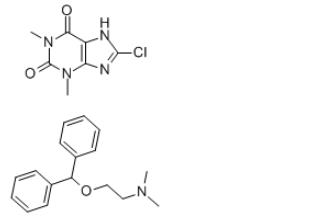Factory Provide Pharmaceutical Raw Materials CAS 523-87-5 Dimenhydrinate

Introduction
Product Name : Dimenhydrinate
Other name:DRAMAMINE;DIMENHYDRINATE;THEOHYDRAMINE;N-[2-DIPHENYLMETHOXYETHYL]-N,N-DIMETHYLAMMONIUM 8-CHLORO-THEOPHYLLINATE
CAS No.: 523-87-5
MF:C17H21NO.C7H7ClN4O2

MW:469.97
Appearance: White Powder
Melting Point :102-107°C
Density :1.2586 (rough estimate)
Storage :Keep in dark place,Sealed in dry,Room Temperature
Diphenhydramine is an antihistamine that reduces the effects of natural chemical histamine in the body. Histamine can produce symptoms of sneezing, itching, watery eyes, and runny nose.Diphenhydramine is used to treat sneezing, runny nose, watery eyes, hives, skin rash, itching, and other cold or allergy symptoms.
Diphenhydramine is also used to treat motion sickness, to induce sleep, and to treat certain symptoms of Parkinson's disease.
When taking diphenhydramine, use caution driving, operating machinery, or performing other hazardous activities.
Diphenhydramine may cause dizziness or drowsiness. If you experience dizziness or drowsiness, avoid these activities.Use alcohol cautiously. Alcohol may increase drowsiness and dizziness while taking diphenhydramine.
Appplication
Dimenhydrinate is an over-the-counter drug used to prevent nausea and motion sickness. It is most commonly prepared as tablets, although it is also available in liquid form and in suppositories. Dimenhydrinate is a combination of two drugs: diphenhydramine and 8-chlorotheophylline, a chlorinated derivative of theophylline.
It is an anti-sick & anti-vomit agent. It is used to prevent from carsickness, seasickness and airsickness, sickness & vomit after radiotherapy and surgical operation, and dizzines /sickness/vomit from medication, Meniere's Syndrome and other diseases. It is also used in the therapy of allergy.
Application
1.skin and mucosa of allergy, such as urticaria, angioneurotic edema, allergic rhinitis, skin itch, pruritus, genital pruritus, or itching jaundice of drug eruption, insect bites and contact dermatitis are also valid;
2. acute allergic reaction, reduces allergic reactions caused by blood transfusion or plasma; often applied before the transfusion antihistamine such as diphenhydramine, usually given to diphenhydramine hydrochloride 40 mg intramuscularly, and pay attention to the screening of blood donors, try not to use with a history of allergy blood donors. To avoid repeating the same blood donors of blood infusion to prevent Antigen-antibody reaction occurs, such as the blood present in the body when there is anti-IgA antibodies, infusion of red blood cells after washing, this method of washing clears donor blood, the IgA in order to prevent the occurrence of allergic reactions.
3.motion sickness-sickness prevention, has strong antiemetic effect can also be used for prevention and treatment of radiation sickness, vomiting after surgery, drug-induced nausea and vomiting;
4.for Parkinson's disease and extrapyramidal symptoms;
5.sedative, hypnotic and preoperative dose;
6.dental anesthesia, when patients allergic to common local anesthetics high 1% diphenhydramine hydrochloride liquid can be used as a local anesthetic for dental;
7.antitussive, as a non-addictive cough medicine is suitable for treating a cold or cough caused by allergies, but its antitussive effects have not been sure.
8.other, Xu Heding, Xue Shijian, Lu Xiaobing and other reports, take diphenhydramine 50mg daily before sleeping, even served 10-14, treat symptoms salivation caused by clozapine, is safe and effective.
